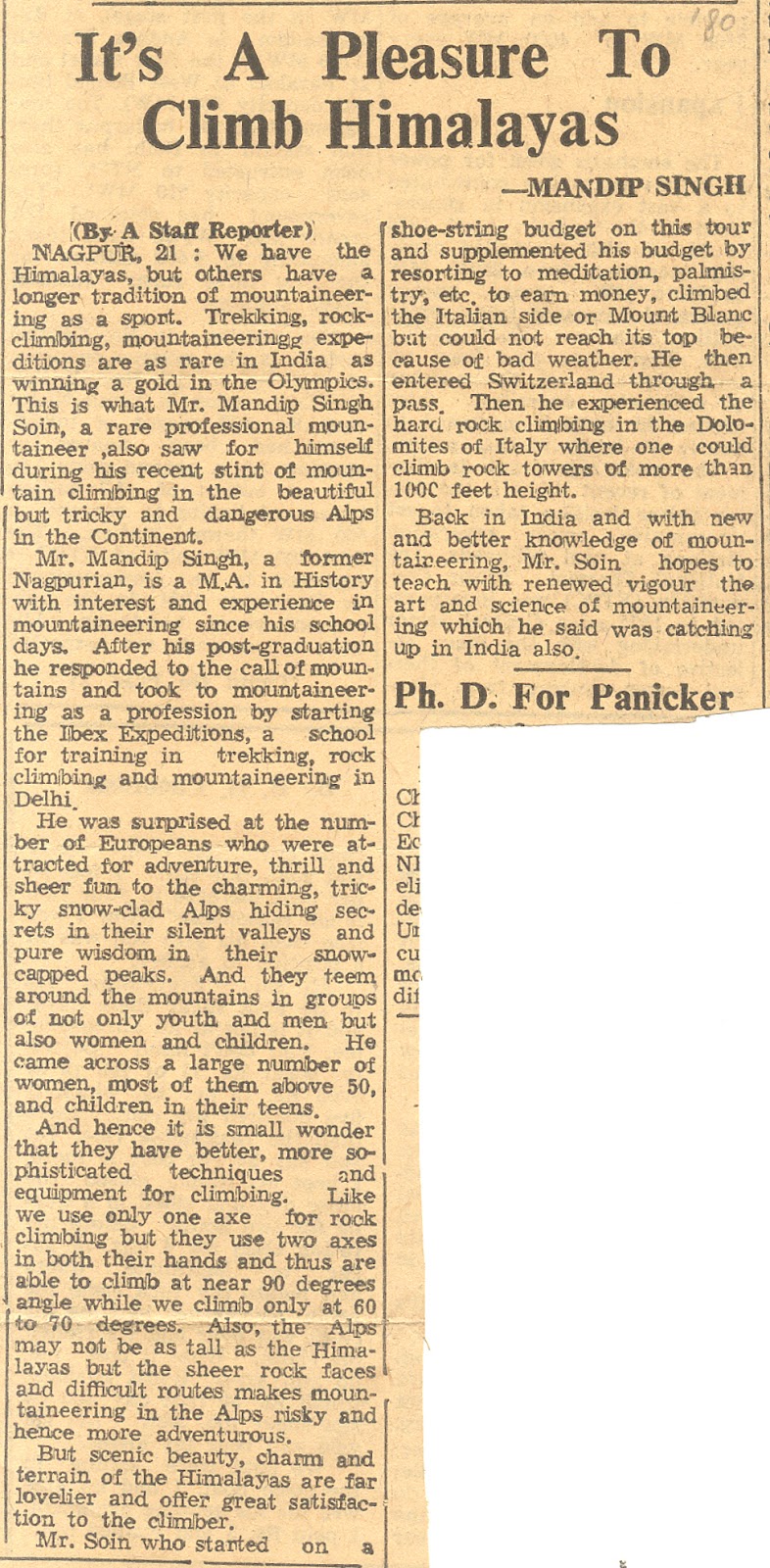~ Midday, April 1983 ~
"If you're seeking adventure...
Come Holiday time, travel agencies vie with each other to sell assorted holiday packages to to potential tourists. The newspapers are full of advertisements promising various exotic and expensive holidays worth a visit, in India and abroad. What strikes one is the monotony of tours offered, week after week, year after year.
The most refreshing vacation idea in recent times comes from Mandip Singh Soin and his band of adventure specialists who conduct adventure tours under the auspices of Ibex Expeditions Pvt. Ltd. of Delhi. Their fare includes mountaineering, trekking, river-rafting, cross-country cycling, camel safaris, skiing, etc. Mandip and his friends have successfully conducted about 25 much adventure tours and are specialists in the field. Starting with an initial capital of Rs. 250 each, contributed by each of the four partners, the company by now, boasts of an annual turnover of Rs. 5,00,000.
Mandip, who passed out of college with a Masters degree in history, toyed with the idea of joining the IAS and had several other job offers as well. However, being a keen hiker and a mountain climber, who liked to spend his time outdoors, he baulked at the thought of a 10 to 5 job, with only one month off in a year. He decided to take up a vocation which he enjoyed. That is how the idea of Ibex tours originated. Along with his friends Sunil Chandra, yound Mandip set up their company in 1979.
Since mountaineering, trekking, rock-climbing and river rafting in the Himalayas is surrounded with a labyrinth of red-tape permissions, approvals, licences, etc., it can be quite fascinating for a lone tourist looking for an off-the-beaten-track kind of a holiday. Ibex people deal with that aspect of it and as their motto says "make molehills out of mountains." They are specialists in adventure holidays and what is surprising is that they are totally independent of any governmental or institutional support.
A typical Ibex holiday consists of parties of ten tourists on an average. Two of the partners trained in all aspects of adventure-touring actually accompany the tourist party; one partner looks after the logistics, and the fourth partner is the accountant. The tourist party assembles at Delhi. They are then flon to Leh and taken to the start-point by bus, or by trekking for mountaineering or rafting, as the case may be.
The duration of th etour is 12 days for rafting. If you combine it with trekking it becomes a 15-day or a 21-day tour. Parties always camp out in the open except in Srinagar and Leh, where they stay in hotels and gues-houses. On certain rivers there is a "guard jeep" that goes along on the mountain road. High quality equipment is used and trained experts help out.
The cycling tours are from Delhi to kathmandu (15 days). On the way back they fly out. Tents are pitched on the roadside for overnight halts, though occasionally they use hotels-normally every third day. Bus and kitchen teams greet the touring parties with food and drink at each halting point.
Camel safaris consist of camel rides and camping through the great Indian desert Thar. A rewarding experience of pulsating colours and tradition-backed sights of Rajasthan - India's barren border state.
Other highlights of the Ibex fare, are tours through the wildlife sancutaries of Dudhwa and Corbett National Parks with overnight stays at the forest rest-house; skiing down 9000-foot high ski slopes of Gulmarg in Jammu and Kashmir state, and mountain climbing in Himachal Pradesh, Nepal and Jammu and Kashmir, where 6000m to 8000m high peaks beckon climbers from all over the world.
"The running of our venture is very informal. The operations have never been mucked upto now, fortunately, even though it is a high risk venture. Sudden storms, landslides, etc., can disrupt the entire schedule. In fact, hoity-toity tourists who can not stand even the slightest discomfort can make us quite desperate," say Mandip.
The operators share amongst themselves the climbing experience of the Indian Himalayas, the Nepalese Himalayas and, the French, Swiss, adn Italian Alps, the Dolomites adn Scotland. The guides that accompany the tourists are the alumni of the Himalayan Mountaineering Institutes. For river rafting, the parties are entrusted to two instructors who have been trained in Oregon (Rogue River) by Osprey Expeditions of USA.
Hang-gliding
To make their itineraries more attractive, Ibex Expeditions are also thinking of including hang-gliding. At present, it is the preserve of the Army, but Ibex guides are being trained in England, who on their return to India will conduct 5-day courses in hang-gliding. Their trainees will test their "wings" off the cliffs around Delhi. They also hope to get licences for their own hang-gliders.
Apart from conducting adventure tours, Ibex also aim at promoting such activity among the youth of our country. They have started by taking youngsters rock-climbing on the ridges around Delhi. By doing this, they hope to make people aware of the wealth of adventure potentially prevalent in the Himalayas and other open spaces in our country.
Their other services include a data bank that supplies maps, photographs and details for any peak in the Indian Himalayas. They have a department that hires mountaineering equipment; gives illustrated lectures on consultancy services for putting up of adventure sport school; building of rock-climbing walls, etc.
Though Ibex people are happy with their promotional efforts, they rue the fact that still almost 90 percent of their clientele is from foreign coutnries, principally from America and Europe. They would welcome more Indians in their tours."

































